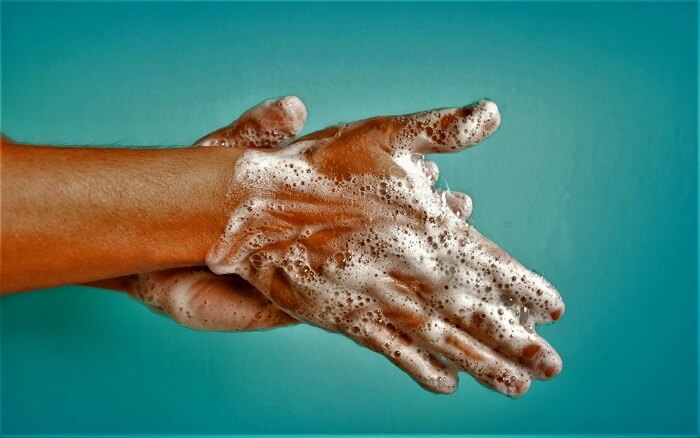Hand Washing DefinitionAsk yourself how much you give time to your hands or hand hygiene. So first, what is meant by hand washing? It is the practice of washing one's hands with soap or hand wash, water, and other cleaning agents to get rid of germs, viruses, and other dangerous and unpleasant items that have been adhered to the hands. While wet and moist hands are more readily decontaminated, drying the cleansed hands is a necessary step in the procedure. If soap and water aren't accessible, use a hand sanitizer containing at least 60% (v/v) alcohol in water if your hands aren't very grimy or oily. It is essential to practice good hand hygiene to stop the transmission of infectious illnesses at home and in other settings. Before and after specific activities, the World Health Organization (WHO) advises washing hands for at least 20 seconds. For example, after using the restroom (for urination, defecation, menstrual hygiene), after cleaning a child's bottom (changing diapers), before feeding a child, before eating, and before/after preparing food or handling raw meat, fish, or poultry are five crucial times during the day where washing hands with soap is important to reduce fecal-oral transmission of disease. When using hand sanitizer or washing your hands is not an option, you can clean your hands with clean water and uncontaminated ash, although it is unclear if this will help or hurt the transmission of germs or viruses. 
Yet, repeated hand washing can dry out the skin, which can harm the skin. Hand washing provides several important health advantages, such as lowering the prevalence of influenza, COVID-19, and other contagious illnesses; avoiding infectious diarrheal disorders; reducing respiratory infections; and lowering the infant mortality rate during home births. According to a 2013 study, better hand-washing habits may result in modest gains in young children's length growth. Simple behavioral modifications, such as hand washing with soap, can lower the death rates of children in underdeveloped nations who contract respiratory and diarrheal disorders. This little measure can practically halve the incidence of death from these conditions. The effectiveness of interventions encouraging hand washing is equivalent to providing clean water in low-income regions in that it can reduce diarrhea bouts by roughly a third. Hand washing with soap is linked to a 48 percent decrease in diarrheal episodes. Handwashing with soap, an instinctive practice practiced in homes, schools, and communities worldwide, is the most simple and cost-effective strategy to prevent diarrhea and Acute Respiratory Infections (ARI). The leading cause of death for children under five is pneumonia, a serious ARI that claims the lives of an estimated 1.8 million kids annually. Together, diarrhea and pneumonia cause over 3.5 million child fatalities each year. According to UNICEF, developing the practice of washing hands with soap before eating and after using the bathroom can save more lives than any vaccination or medical treatment, reducing fatalities from acute respiratory infections by 25% and diarrhea deaths by almost half. Often, hand washing is included with other sanitary measures as part of water. When to Wash Your Hands
How to Properly Wash Your HandsFor good hand washing:
Hand hygiene is more than just washing your hands. As your best defense against illness, your skin needs to be taken care of generally. After completely drying your hands, you may take care of your hands by doing the following. Use an absorbent hand lotion with a water basis three to four times daily, or more often if your hands are always in the water. To protect your hands when cleaning dishes, wear gloves. To avoid embedded soil buildup or scrapes when gardening, use gloves. If an inflammation of the skin worsens or persists, see a doctor. All soaps are equally efficient in eliminating disease-causing germs when used with the above-described handwashing procedures. Regular soap is sufficient, and antibacterial soap is not essential or superior. Hand sanitizer is inferior to soap and water. Certain viruses, such as the coronavirus, can be effectively treated using alcohol-based hand sanitizers; however, gastroenteritis cannot be treated with them. The best defense against gastroenteritis infection is frequent hand washing with soap and water. Washing your hands with soap and water is recommended. Use an alcohol-based hand sanitizer with at least 60% alcohol if none is available. How do Germs SpreadWhen someone coughs or sneezes, tiny droplets of infectious material are discharged into the atmosphere. These minute droplets may fly up to six feet and transmit diseases when they touch objects or enter someone else's eyes, nose, or mouth. Rarely, the remnants of these tiny droplets might hang in the air for hours and travel longer than bigger droplets because of air currents. Other persons can inhale these droplets. A CF care facility employs infection prevention and control strategies to stop the spread of harmful bacteria among CF patients. They include hand washing often, donning gowns and gloves, and assisting individuals with CF to maintain a safe 6-foot separation from one another when they visit the care facility or are admitted to the hospital. How Can We Protect Ourselves from the Germs?
Next TopicHardness Definition
|
 For Videos Join Our Youtube Channel: Join Now
For Videos Join Our Youtube Channel: Join Now
Feedback
- Send your Feedback to [email protected]
Help Others, Please Share










